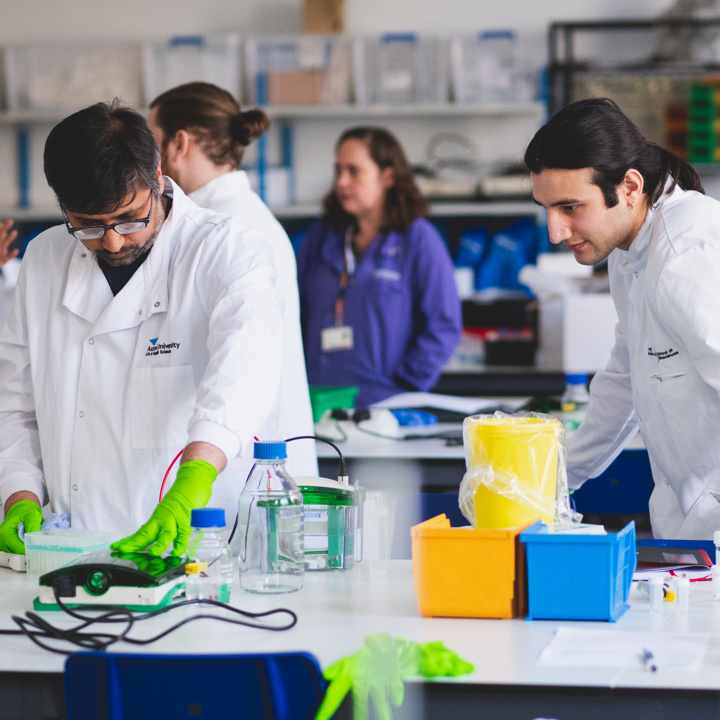
Current Training Offerings
The Biochemical Society currently provides a range of training events that cater to the specific needs of the bioscience community.
These include hands-on practical courses, computational workshops, and events featuring talks from leading researchers and industry experts. All training sessions are designed to achieve clearly defined learning objectives, such as developing technical skills, gaining certification or CPD points, and enhancing career readiness. Networking opportunities are an integral part of the events, ensuring participants benefit from professional connections.
Online training
R for Biochemists 101 is an introductory course designed to equip beginners with the tools and techniques to use R for data manipulation and visualisation in biochemical research. Across five modules, you'll learn R fundamentals, create customised graphs, analyse enzyme kinetics, and generate visualisations like volcano plots.
This course is authored by Dr Paul Brennan and developed in partnership with the Biochemical Society.
This follow-up training to R101 helps you enhance your R skills for proteomic data analysis. Explore modern data techniques, packages, and visualisations to uncover the secrets of tidy data, and master best practices for reproducible workflows across four modules.
This course is authored by Dr Paul Brennan and developed in partnership with the Biochemical Society.
This course teaches essential Python skills for real-world research, including scripting, using libraries, data import, and data analysis with packages like NumPy, Pandas, Sklearn, and Matplotlib. No prior coding experience is needed, and learners can complete the course at their own pace.
This course is authored by Emma Rand (University of York), with contributions from Annabel Cansdale, Josh Hope and Richard Maguire, and developed in partnership with the Biochemical Society.
This course covers fundamental statistical concepts and techniques essential for biochemistry and related fields. Learn how to analyse and interpret data, apply statistical methods, and enhance your research skills.
This course is authored by Dr Donald Reid (University of Glasgow) and developed in partnership with the Biochemical Society.


In-person training
This training event covers the latest bioinformatic tools for construct design and protein characterisation, tips and tricks for improving protein expression, purification, stability/preparation and evaluating protein quality with biophysical techniques.
This training event focuses on the function on biological membranes and on the biophysical techniques available to study their components in the context of biology and biotechnology. The event will comprise lectures, computer and laboratory-based practical sessions.
This training event aims to expose participants to the latest hardware involved in protein purification and biophysical measurements of the hydrodynamic radius and sedimentation properties of a protein in the presence and absence of ligands, using AKTA START protein purification systems, the Fluidity One-W and the new multiwavelength Analytical Ultracentrifuge.
This training event is for education focused academics in the biosciences, and will also be useful for postgraduate and early career researchers considering a move into an education-focused role. Group discussions will form the foundation of this event. Join us to build networks, share insights, and unlock the door to successful bioscience education research.
Designed and delivered by experts from industry and academia, this training event will provide a comprehensive overview of the pre-clinical drug discovery process. The workshop will focus on small molecule target identification and validation, hit-to-lead and lead optimisation, as well as on preclinical drug development and toxicology. The programme will include lectures, case studies and small group discussions, and will provide an opportunity for delegates to engage with speakers


Training schedule
- Practical Python for Beginners
- The UK Membrane Proteins Workshop
- Introduction to Statistics for the Life Sciences
- R for Biochemists 201
- Educational Research in the Biosciences
- Protein Purification and Biophysical Characterisation
- R for Biochemists 101
- Practical Python for Beginners
- Introduction to Statistics for the Life Science
- Engineering Recombinant Proteins for Structural and Functional Studies
- Key Aspects of Modern Drug Discovery
-
R for Biochemists 201
-
R for Biochemists 101


Contact us
For further information on training or to discuss a proposal, please get in touch with the Education department or make a pre-submission enquiry.
